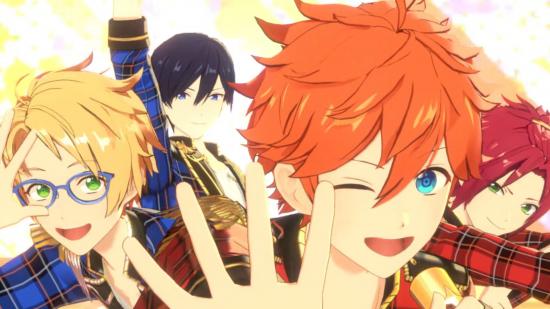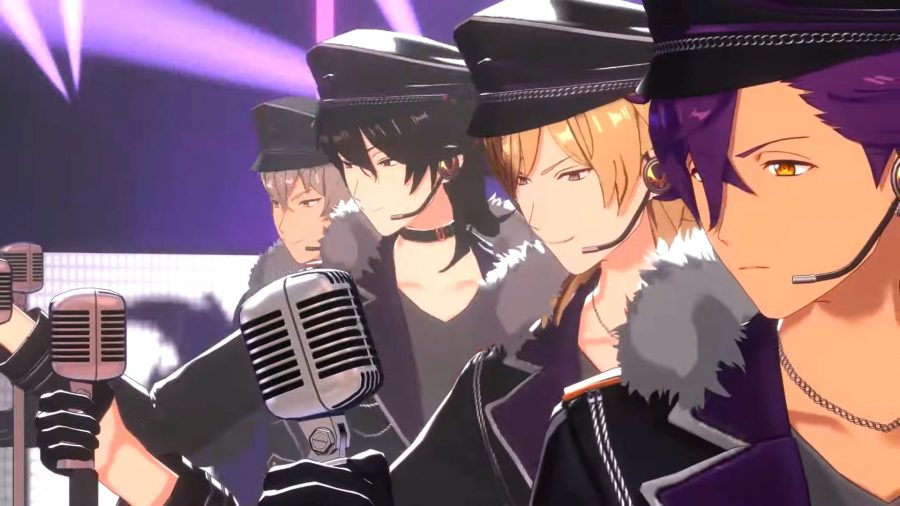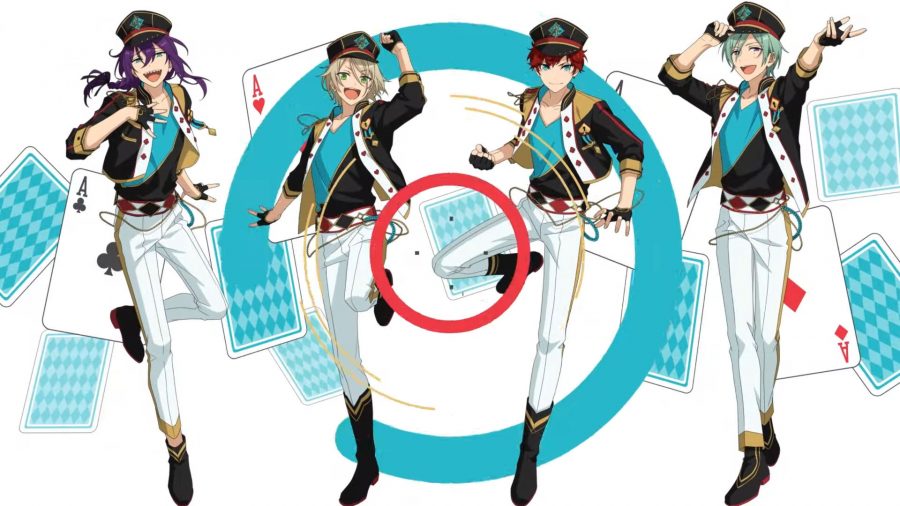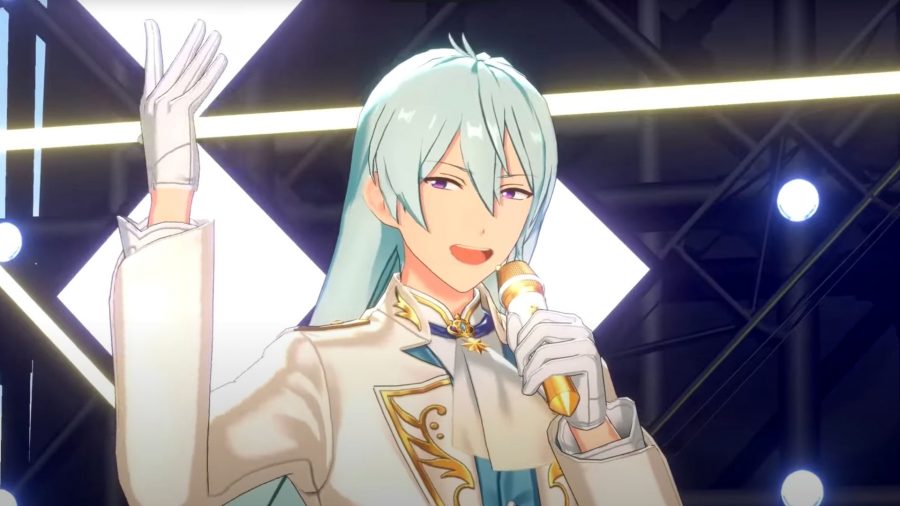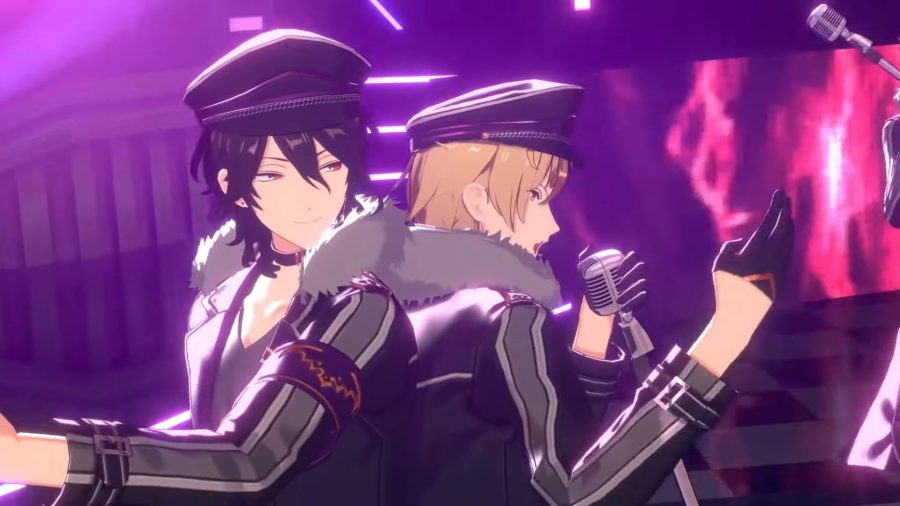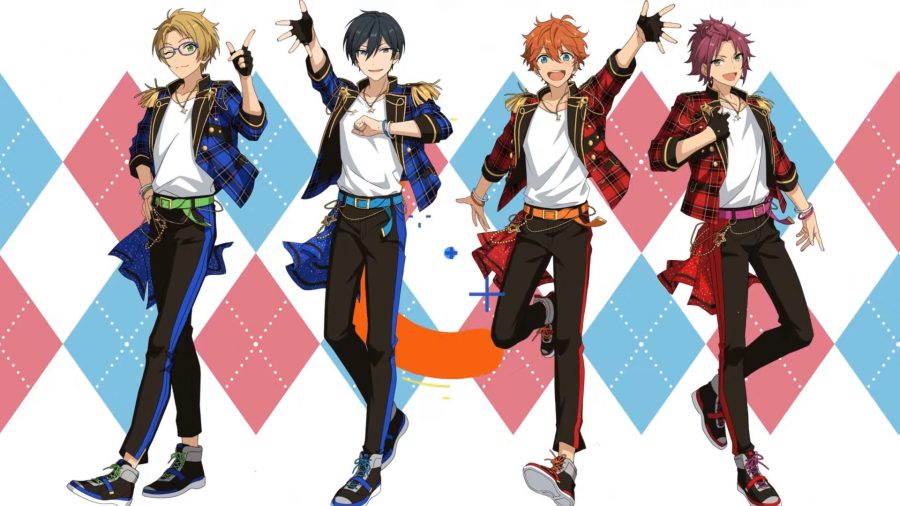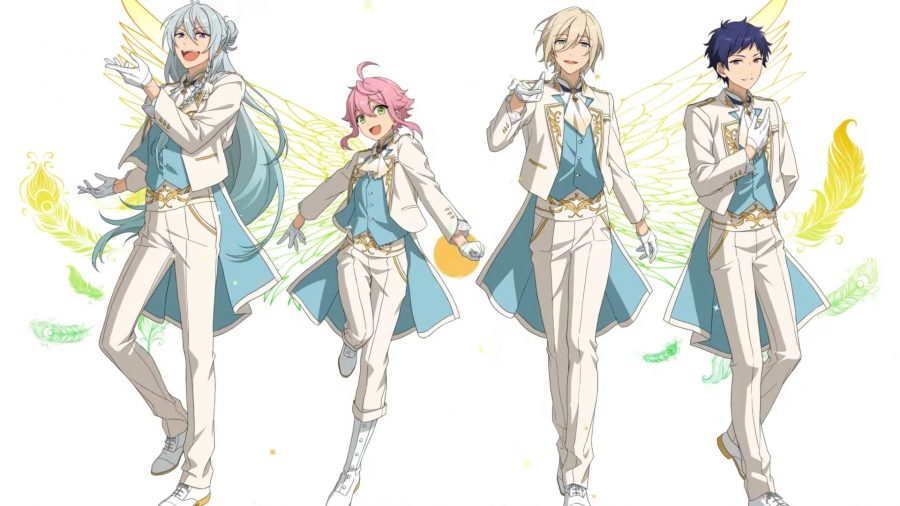In Ensemble Stars Music, cards are just about the most important tools of the trade. Why? Well, because obtaining cards is how you recruit new idols, of course! And what’s an idol group music producer without idols? So, if you want to rise to the top in this immersive, all-direction anime rhythm game and help these gorgeous guys achieve their dreams, you’re in the right place.
Our Ensemble Stars Music cards guide not only compiles a list of all the cards currently available in the EN version of the game – we’ve also gone in-depth about the scouting system, banners, and what all of the details on your newly-acquired cards mean. Keep in mind that new Ensemble Stars Music cards drop all the time, so we’ll be sure to update this guide regularly to include them all.
If you want to keep the beat boppin’, be sure to check out our lists of the best rhythm games on mobile and the best Switch rhythm games. Or if you’re more interested in the cute-guy-gacha genre, head over to our Tears of Themis cards or Twisted Wonderland cards guides. We’ve got something for everyone.
Ensemble Stars Music cards
Five-star Ensemble Stars Music cards
- (A Breath of Spring Air) Eichi Tenshouin
- (A Lively Spring Storm) Wataru Hibiki
- (Daring Spy) Eichi Tenshouin
- (Devoted Valet) Yuzuru Fushimi
- (How I Appear in your Eyes) Wataru Hibiki
- (In the Shadow) Mika Kagehira
- (Leader of Art) Shu Itsuki
- (Leader of Cards) Hiro Amagi
- (Leader of Crimson) Keito Hasumi
- (Leader of Demons) Rei Sakuma
- (Leader of Heaven) Eichi Tenshouin
- (Leader of Heaven) Eichi Tenshouin
- (Leader of Honey Bees) Rinne Amagi
- (Leader of Justice) Chiaki Morisawa
- (Leader of Loyalty) Tsukasa Suou
- (Leader of Magic) Natsume Sakasaki
- (Leader of Paradise) Nagisa Ran
- (Leader of Rabbits) Tomoya Mashiro
- (Leader of Stars) Hokuto Hidaka
- (Leader of Twin Stars) Hinata Aoi
- (Light Illuminating Winter) Wataru Hibiki
- (Lively Bunny) Wataru Hibiki
- (Passion Burning Within the Idol) Yuzuru Fushimi
- (Pink Crystals) Tori Himemiya
- (Red that Pierces Through the Clouds) Tori Himemiya
- (Red that Sings for the Advent of Morning) Eichi Tenshouin
- (Red-Flamed Judge) Yuzuru Fushimi
- (Secret Sanctuary) Wataru Hibiki
- (Snow White Brim) Tori Himemiya
- (The Burning Star of Hope) Eichi Tenshouin
- (The Princely Princess I Aspire to Be) Tori Himemiya
Four-star Ensemble Stars Music cards
- (A Peaceful Spring Day) Eichi Tenshouin
- (Adorable Flower) Hajime Shino
- (An Artistic Style That’s Inherent to Rock) Wataru Hibiki
- (Anticipation and Surprise) Yuzuru Fushimi
- (Antique Samurai) Souma Kanzaki
- (Assertive Performer) Izumi Sena
- (Being the Heroine) Tori Himemiya
- (Bizarre Introvert) Mayoi Ayase
- (Blessed Bouquet) Eichi Tenshouin
- (Carefree Chef) Niki Shiina
- (Caring Administrator) Mao Isara
- (Casual Observer) Ritsu Sakuma
- (Combative Spirit) Koga Ogami
- (Courteous Beast) Jun Sazanami
- (Dazzling Stars) Subaru Akehoshi
- (Dormitory Roommates) Wataru Hibiki
- (Entertainer’s Dead End) Wataru Hibiki
- (Enthusiast of Manliness) Tetora Nagumo
- (Escaping the Heat After School) Yuzuru Fushimi
- (Excitement and Surprise) Tori Himemiya
- (Fledgling Artist) Mika Kagehira
- (Flexible Missionary) Tatsumi Kazehaya
- (Free Breeze) Kaoru Hakaze
- (Frontline Hunting Dog) Yuzuru Fushimi
- (Glittering Yellow Comet) Sora Harukawa
- (Growing Little Wings) Tori Himemiya
- (Guarding Bluebird) Tsumugi Aoba
- (Idol Maniac) Aira Shiratori
- (In Pursuit of Beauty) Arashi Narukami
- (Ingratiating Student) Tori Himemiya
- (Knowledgeable Analyst) Makoto Yuuki
- (Love and Surprises) Wataru Hibiki
- (Mascots Lover) Midori Takamine
- (Mediating Red) Yuzuru Fushimi
- (Ninja Lover) Shinobu Sengoku
- (Obedient Butler) Yuzuru Fushimi
- (Obedient Servant) Yuzuru Fushimi
- (Ocean Lover) Kanata Shinkai
- (Pair of Meteors) Yuta Aoi
- (Playing Rock in the Spotlight) Eichi Tenshouin
- (Presenting a New Creation) Eichi Tenshouin
- (Pursuer of Love and Surprise) Wataru Hibiki
- (Ring of Smiles) Eichi Tenshouin
- (Sanctuary of Confusion) Tori Himemiya
- (Secret Idol) HiMERU
- (Sensitive Composer) Leo Tsukinaga
- (Shape of Love) Tori Himemiya
- (Silent Gentleman) Adonis Otogari
- (Sky-Clearing Red) Wataru Hibiki
- (Smiling Noble) Hiyori Tomoe
- (Spring Festival) Yuzuru Fushimi
- (StarPro’s Attendant) Yuzuru Fushimi
- (StarPro’s Prized Flower) Tori Himemiya
- (StarPro’s Representative) Eichi Tenshouin
- (StarPro’s Sunshine) Wataru Hibiki
- (Strategic Tactician) Ibara Saegusa
- (Striving Towards Rock) Tori Himemiya
- (Succeeding in Rock) Yuzuru Fushimi
- (Task Receiver) Kohaku Oukawa
- (The Dexterous Strong) Kuro Kiryu
- (The Overlooking Rabbit) Nazuna Nito
- (Vigorous Sun) Mitsuru Tenma
- (Water and Life) Kanata Shinkai
Three-star Ensemble Stars Music cards
- (A Gentle Spring) Tori Himemiya
- (A Moment to Rest) Yuzuru Fushimi
- (A New Lifestyle) Yuzuru Fushimi
- (A Sunny Spring) Yuzuru Fushimi
- (Absolute Prince) Eichi Tenshouin
- (Adults’ Afternoon) Eichi Tenshouin
- (Drawing of the Roaring Waves) Yuzuru Fushimi
- (Entertaining Art) Wataru Hibiki
- (Flower-Filled Stage) Wataru Hibiki
- (Humans and Animals) Wataru Hibiki
- (Light Red Ox Envoy) Tori Himemiya
- (Mastermind’s Plan) Eichi Tenshouin
- (Planning a Future Trip) Tori Himemiya
- (Pleasant Filming) Hajime Shino
- (Poppycock Brim) Eichi Tenshouin
- (Practice) Adonis Otogari
- (Practice) Aira Shiratori
- (Practice) Arashi Narukami
- (Practice) Chiaki Morisawa
- (Practice) Eichi Tenshouin
- (Practice) Hajime Shino
- (Practice) Hiiro Samagi
- (Practice) HiMERU
- (Practice) Hinata Aoi
- (Practice) Hiyori Tomoe
- (Practice) Hokuto Hidaka
- (Practice) Ibara Saegusa
- (Practice) Izumi Sena
- (Practice) Jun Sazanami
- (Practice) Kanata Shinkai
- (Practice) Kaoru Hakaze
- (Practice) Keito Hasumi
- (Practice) Koga Ogami
- (Practice) Kohaku Oukawa
- (Practice) Kuro Kiryu
- (Practice) Leo Tsukinaga
- (Practice) Madara Mikejima
- (Practice) Makoto Yuuki
- (Practice) Mao Isara
- (Practice) Midori Takamine
- (Practice) Mika Kagehira
- (Practice) Mitsuru Tenma
- (Practice) Nagisa Ran
- (Practice) Natsume Sakasaki
- (Practice) Nazuna Nito
- (Practice) Niki Shiina
- (Practice) Rei Sakuma
- (Practice) Rinne Amagi
- (Practice) Ritsu Sakuma
- (Practice) Shinobu Sengoku
- (Practice) Shu Itsuki
- (Practice) Sora Harukawa
- (Practice) Souma Kanzaki
- (Practice) Subaru Akehoshi
- (Practice) Tatsumi Kazehaya
- (Practice) Tetora Nagumo
- (Practice) Tomoya Mashiro
- (Practice) Tori Himemiya
- (Practice) Tsukasa Suou
- (Practice) Tsumugi Aoba
- (Practice) Wataru Hibiki
- (Practice) Yuta Aoi
- (Practice) Yuzuru Fushimi
- (Sage’s Expectations) Wataru Hibiki
- (Sanctuary of Progression) Yuzuru Fushimi
- (Sanctuary of Realisation) Eichi Tenshouin
- (Spring and Eternity) Wataru Hibiki
- (Spring and Expectations) Tori Himemiya
- (Stage of Fledgling) Aira Shiratori
- (Surprising Wukong) Wataru Hibiki
- (Tag-Along Hungry) Tori Himemiya
- (Troubled Actor) Tomoya Mashiro
Two-star Ensemble Stars Music cards
- (ES Idol) Adonis Otogari
- (ES Idol) Aira Shiratori
- (ES Idol) Arashi Narukami
- (ES Idol) Chiaki Morisawa
- (ES Idol) Eichi Tenshouin
- (ES Idol) Hajime Shino
- (ES Idol) Hiiro Amagi
- (ES Idol) HiMERU
- (ES Idol) Hinata Aoi
- (ES Idol) Hiyori Tomoe
- (ES Idol) Hokuto Hidaka
- (ES Idol) Ibara Saegusa
- (ES Idol) Idori Himemiya
- (ES Idol) Izumi Sena
- (ES Idol) Jun Sazanami
- (ES Idol) Kanata Shinkai
- (ES Idol) Kaoru Hakaze
- (ES Idol) Keito Hasumi
- (ES Idol) Koga Ogami
- (ES Idol) Kohaku Oukawa
- (ES Idol) Kuro Kiryu
- (ES Idol) Leo Tsukinaga
- (ES Idol) Madara Mikejima
- (ES Idol) Makoto Yuuki
- (ES Idol) Mao Isara
- (ES Idol) Mayoi Awase
- (ES Idol) Midori Takamine
- (ES Idol) Mika Kagehira
- (ES Idol) Mitsuru Tenma
- (ES Idol) Nagisa Ran
- (ES Idol) Natsume Sakasaki
- (ES Idol) Nazuna Nito
- (ES Idol) Niki Shiina
- (ES Idol) Rei Sakuma
- (ES Idol) Rinne Amagi
- (ES Idol) Ritsu Sakuma
- (ES Idol) Shinobu Sengoku
- (ES Idol) Shu Itsuki
- (ES Idol) Sora Harukawa
- (ES Idol) Souma Kanzaki
- (ES Idol) Subaru Akehoshi
- (ES Idol) Tatsumi Kazehaya
- (ES Idol) Tetora Nagumo
- (ES Idol) Tomoya Mashiro
- (ES Idol) Tori Himemiya
- (ES Idol) Tsukasa Suou
- (ES Idol) Tsumugi Aoba
- (ES Idol) Wataru Hibiki
- (ES Idol) Yuta Aoi
- (ES Idol) Yuzuru Fushimi
One-star Ensemble Stars Music cards
- (An Idol) Adonis Otogari
- (An Idol) Aira Shiratori
- (An Idol) Arashi Narukami
- (An Idol) Chiaki Morisawa
- (An Idol) Eichi Tenshouin
- (An Idol) Hajime
- (An Idol) Hiiro Amagi
- (An Idol) HiMERU
- (An Idol) Hinata Aoi
- (An Idol) Hiyori Tomoe
- (An Idol) Hokuto Hidaka
- (An Idol) Ibara Saegusa
- (An Idol) Isumi Sena
- (An Idol) Jun Sazanami
- (An Idol) Kanata Shinkai
- (An Idol) Kaoru Hakaze
- (An Idol) Keito Hasumi
- (An Idol) Koga Ogami
- (An Idol) Kohaku Oukawa
- (An Idol) Kuro Kiryu
- (An Idol) Leo Tsukinaga
- (An Idol) Madara Mikejima
- (An Idol) Makoto Yuuki
- (An Idol) Mao Isara
- (An Idol) Mayoi Ayase
- (An Idol) Midori Takamine
- (An Idol) Mika Kagehira
- (An Idol) Mitsuru Tenma
- (An Idol) Nagisa Ran
- (An Idol) Natsume Sakasaki
- (An Idol) Nazuna Nito
- (An Idol) Niki Shiina
- (An Idol) Rei Sakuma
- (An Idol) Rinne Amagi
- (An Idol) Ritsu Sakuma
- (An Idol) Shinobu Sengoku
- (An Idol) Shu Itsuki
- (An Idol) Sora Harukawa
- (An Idol) Souma Kanzaki
- (An Idol) Subaru Akehoshi
- (An Idol) Tatsumi Kazehaya
- (An Idol) Tetora Nagumo
- (An Idol) Tomoya Mashiro
- (An Idol) Tori Himemiya
- (An Idol) Tsukasa Suou
- (An Idol) Tsumugi Aoba
- (An Idol) Wataru Hibiki
- (An Idol) Yuta Aoi
- (An Idol) Yuzuru Fushimi
Cards obtained through Ensemble Stars Music codes
There are several exclusive cards only obtainable through Ensemble Stars Music codes. Unfortunately, these serial codes are not the same as promo codes from other games – they are unique, single-use codes that come with the purchase of the official Ensemble Stars fanbooks, visual novels, and volume one CDs, most of which are now out of stock. However, if you did (or do) manage to get your hands on an Ensemble Stars Music serial code, here are the cards you could get.
- (Bromide) Subaru Akehoshi
- (Heaven’s Hymn) Eichi Tenshouin
- (Oath’s Unison) Leo Tsukinaga
- (Outdoor Photography) Makoto Yuuki
- (Revolutionary Victory Song) Eichi Tenshouin
- (Revolutionary Victory Song) Tori Himemiya
- (Revolutionary Victory Song) Wataru Hibiki
- (Revolutionary Victory Song) Yuzuru Fushimi
- (Small Footsteps) Nazuna Nito
- (Song of Justice) Chiaki Morisawa
- (Song of the Evening Moonlight) Keito Hasumi
- (Tone of Darkness) Rei Sakuma
- (Unison of Two) Hinata Aoi
- (Youth Capriccio) Hokuto Hidaka
- (Youth Capriccio) Makoto Yuuki
- (Youth Capriccio) Mao Isara
- (Youth Capriccio) Subaru Akehoshi
- (Youthful Song of Hope) Hokuto Hidaka
What are Ensemble Stars Music cards and how do they work?
Ensemble Stars Music cards represent the idols that you recruit throughout the game. When you obtain a card you unlock the corresponding version of an idol, allowing you to level them up, choose them for live performances, put them in your Idol Room, unlock their Idol Roads and stories, and equip them with outfits.
While there are certainly some cards that perform better than others, due to the nature of the game, we recommend simply picking and upgrading the cards of the idols you like the most rather than worrying about meta.
Cards come in five levels of rarity, from one-star to five-star, with one-star cards being the most common and five-star cards being the rarest. The rarer the card, the greater its max level, ability values, and max number of fans.
You begin the game with a copy of every one-star card to start you off, and you can choose one team to pull a random five-star idol from. After that, you can gain more cards through ‘scouting’. Scouting is Ensemble Stars Music’s gacha system, where you redeem specific currencies or tokens in exchange for new cards, which are randomised on each pull. Different banners offer increased drop rates on specific cards. You can click on a banner’s ‘card list’ to see the drop rate for each card.
Every card has its own unique details, which you can view by tapping the card button on the home screen, then selecting the card you want to inspect. Here are all the different details and what they mean.
SPP – five-star and four-star cards have an ‘SPP’ button at the top-left corner. This is their special performance, which you can unlock through their Idol Road. Each SPP corresponds to a specific song unique to the character, and this button allows you to check which song this card’s special performance is for
Change CG – upon reaching the end of a card’s Idol Road, you can ‘bloom’ a card. Bloomed cards receive different art, as well as an overall stat increase. The change CG button allows you to switch between the default and bloomed card artwork
Attributes – next to the title of a card, for example ‘(Practice)’ or ‘(An Idol)’, there’s a small, coloured icon that represents an attribute. There are four attributes in total – blue is brilliant, yellow is flash, red is sparkle, and green is glitter. Every card and song in Ensemble Stars Music aligns with one of these four attributes, with the exception of songs marked with a rainbow triangle which aligns with all attributes. When you have a card in your unit with an attribute that matches the song you’re playing, the card receives a bonus to all ability values
Fans – the number next to the heart at the top-right corner of the card represents how many fans the card has, and the max number of fans the card can acquire. The max number of fans a card can acquire depends on the rarity of the card, and if you’ve pulled any duplicates of that card. You gain more fans for a card by using it in live performances, and the number of fans you gain per performance increases based on how much BP you use. You also gain an increased amount of fans per live performance on the card’s featured character’s birthday. Reaching a certain number of total fans for a card is one of the conditions required for you to increase an idol’s rank. You can view this in the idol room. When you increase the rank of an idol, you unlock unique stories and voice clips for them
Level – below the name of the card, you can see the card’s current level, max level cap, how much experience is required before the card reaches the next level, and the level up button. Hit the level up button to use EXP tickets and level up the card. There are three types of EXP tickets – gold (L), silver (m), and bronze (s) – each of which offer different levels of EXP. You can acquire these through completing missions and performances. Leveling up a card increases its ability values, and unlocks different milestones in the Idol Road
Abilities – abilities are the different stats the card possesses. There are three different types of ability, each with their own scores unique to the card – Dance (Da), Vocal (Vo), and Performance (Pf) – all of which add up to the card’s overall ability level. Abilities dictate how well the idol performs in Lives, and increasing a card’s ability levels by purchasing upgrades on the Idol Road allows you to earn higher scores when using that card during Lives
Idol Road – to the right of the card is a yellow button where you can access the card’s Idol Road. Each card has its own Idol Road, where you can purchase boosts for skills and abilities, outfits, stories, voice clips, and backgrounds specific to the card. In order to purchase these items and upgrades, you need materials called ‘Pieces’ which come in multiple sizes and types. Next to the Idol Road button on the card’s page, you can see how far you’ve progressed through the Idol Road, and the icons below indicate how many outfits and backgrounds are available for purchase
Live Skills – below the Idol Road section of a card’s page, you can see the Live Skills the card possesses. There are three different kinds of Live Skills available in the game – Center, Live, and Support – which dictate the role the idol excels at during live performances. In order to activate a card’s Live Skills during a performance, you must hit a Live Skill note (a larger blue note with a white star at the centre), with good accuracy or better. Flaunting skills on stage earns you higher scores
And there we have it, a crash course in Ensemble Stars Music cards, including every card you can get in-game at the moment, and what all of their details and skills mean. We hope this helps you on your way to becoming a top music producer! If you’re looking to switch up the beat, check out our list of the best mobile games and try something new today.
